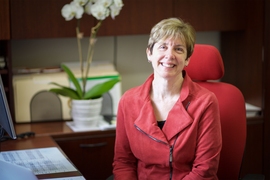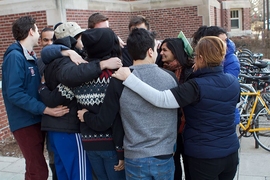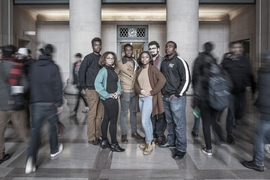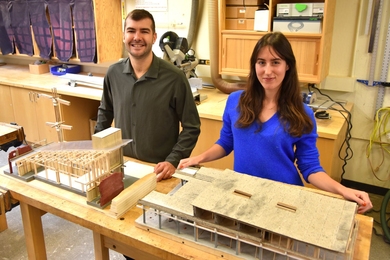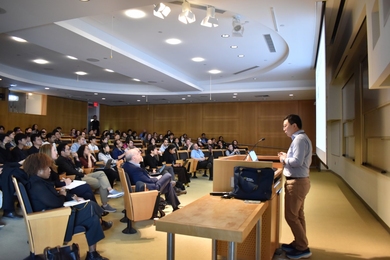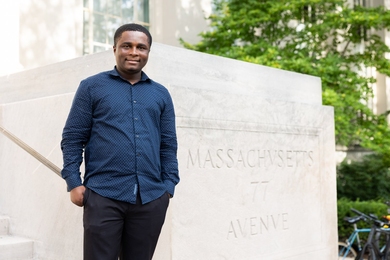Vice President and Dean for Student Life Suzy Nelson arrived at the Division of Student Life (DSL) on July 1, 2016, bringing with her 32 years of experience building open, effective partnerships with students through her work at Colgate University, Harvard University, Cornell University, and Syracuse University. Nelson’s commitment to enhancing all aspects of the student life experience is evident in her recent work to renew residence halls and student spaces, promote student wellbeing, and make MIT a welcoming campus for everyone. Following last week’s federal action related to protections for transgender students, Nelson sat down to reaffirm MIT’s support for all students, reflect on how they give her “hope” in the current political climate, and update the community on efforts to promote diversity and inclusion.
Q: Last week, the U.S. Departments of Justice and Education withdrew guidelines from the Obama administration designed to ensure "transgender students enjoy a supportive and nondiscriminatory school environment.” Will this decision impact MIT students or policies?
A: This is an important question because I know the action has created anxiety for members of our transgender community and their friends and allies. I want them to hear directly from me that we are steadfast in our support for them.
The short answer to whether this decision will impact MIT students or policies is no, it absolutely will not. Our commitment to providing an inclusive, welcoming, and respectful educational, living, and working environment has not changed, and it will not change. Gender identity for students and employees is protected under MIT’s nondiscrimination policies as well as under Massachusetts state law. Additionally, regardless of the federal Departments’ interpretation of Title IX, MIT believes that transgender students’ gender identities should be respected, including when it comes to restroom access. We are also working to streamline the process so that students can more easily change their name and gender in MIT official records.
I want students who have questions or concerns about this federal action to know they can come to me and the members of the LBGTQ@MIT and Title IX teams. We are ready to answer any questions they may have and to support them in any way we can.
Q: Changes in federal policies have prompted strong responses from the MIT student community. What are your impressions of how they have been organizing and speaking out?
A: Many students are speaking out about issues that affect them and others whom they know. In a respectful and thoughtful way, MIT’s students have raised up their concerns about social issues and the recent executive orders. I have been impressed by students’ openness to dialogue, especially when there is profound disagreement and division within our country.
This is the type of level-headed thinking that gives me hope because coming together is what we need to do right now. Moreover, our actions need to be guided by critical thinking and our ability to listen and to empathize with each other. In the end, it is the bond of humanity that unites us. And it’s that bond that often helps us find common ground when we disagree.
Even before the change in administrations, I was impressed by how engaged and involved MIT students are. Students here see the world through a critical lens, and want to make it better. That’s the core of the MIT mission too, and it’s great to see them apply the same lens to their own experience and environment. Their voices are definitely making a difference in the student experience.
Q: A specific example of where MIT students’ voices are making a difference is in efforts to advance diversity and inclusion, issues that are key priorities for you as well. Can you talk about the ways DSL is working with students, faculty, and staff to make MIT a welcoming campus for all?
A: Issues of social justice and equity are important to me personally, and they are part of the reason I wanted to work in higher education. When I came to MIT, one of the first things I did was to learn more about the recommendations outlined by the Black Students’ Union (BSU), Black Graduate Student Association (BGSA), and many others, and the work being done to implement them.
All students who were involved in developing the recommendations deserve to be commended for their leadership. They applied their critical lens to our environment and developed thoughtful, constructive, and specific solutions to make things better. I also admire how they were careful and purposeful about incorporating the views of all underrepresented students into their recommendations. And I am grateful for their willingness to partner with faculty and staff throughout the implementation process.
I am a member of the Academic Council Working Group President Reif established to help make these recommendations a reality, so I am fortunate to have a front row seat to the progress underway.
DSL was very involved in responding to the recommendation calling for a diversity session at orientation for undergraduates. I was one of the 30 faculty and staff who were trained to help facilitate this session for incoming students last August, and it was very thought-provoking and educational for everyone involved. Student feedback on the session was very positive. I am very pleased that this will be an annual event going forward.
Additionally, MIT has doubled down on its commitment to affordability and accessibility. The financial aid budget rose by 10.4 percent in 2016-17 alone.
Dr. Karen Singleton, a recognized leader in providing multicultural mental healthcare, is now leading Mental Health and Counseling Service and, in the last year, MIT Medical has hired three clinicians with expertise in race-based trauma.
Nearly all of our academic departments have responded to the students’ calls for the development and posting of statements that highlight each department’s commitment to health, diversity, and inclusion. And new diversity-related data is being gathered and posted so that we can measure our progress and make informed decisions about next steps.
At DSL, we have identified making a welcoming campus for everyone as a key priority — it’s part of our new mission and agenda. We’ve been approaching this goal from a few different angles:
- First, we formed a committee to look at diversity and inclusion in our division, and between staff and students. This group is drafting a DSL diversity and inclusion statement, and getting input from a range of people. We expect we will have a final draft by the end of the spring term. As important as the result of this work is, the process itself helps us examine our values and expectations about engaging others in a respectful and caring way.
- In the community, DSL and the Institute Community and Equity Office hosted an event last semester with Dr. Mahzarin Banaji from Harvard, who studies hidden bias and co-authored the book, "Blindspot: Hidden Biases of Good People." The main room in Walker Memorial was almost filled, which I found very encouraging.
- But, because real change comes from sustained education, we are exploring a series of learning opportunities, including unconscious bias training, that will help DSL staff develop the knowledge, skills, and awareness for cultivating a respectful and welcoming campus community for all.
